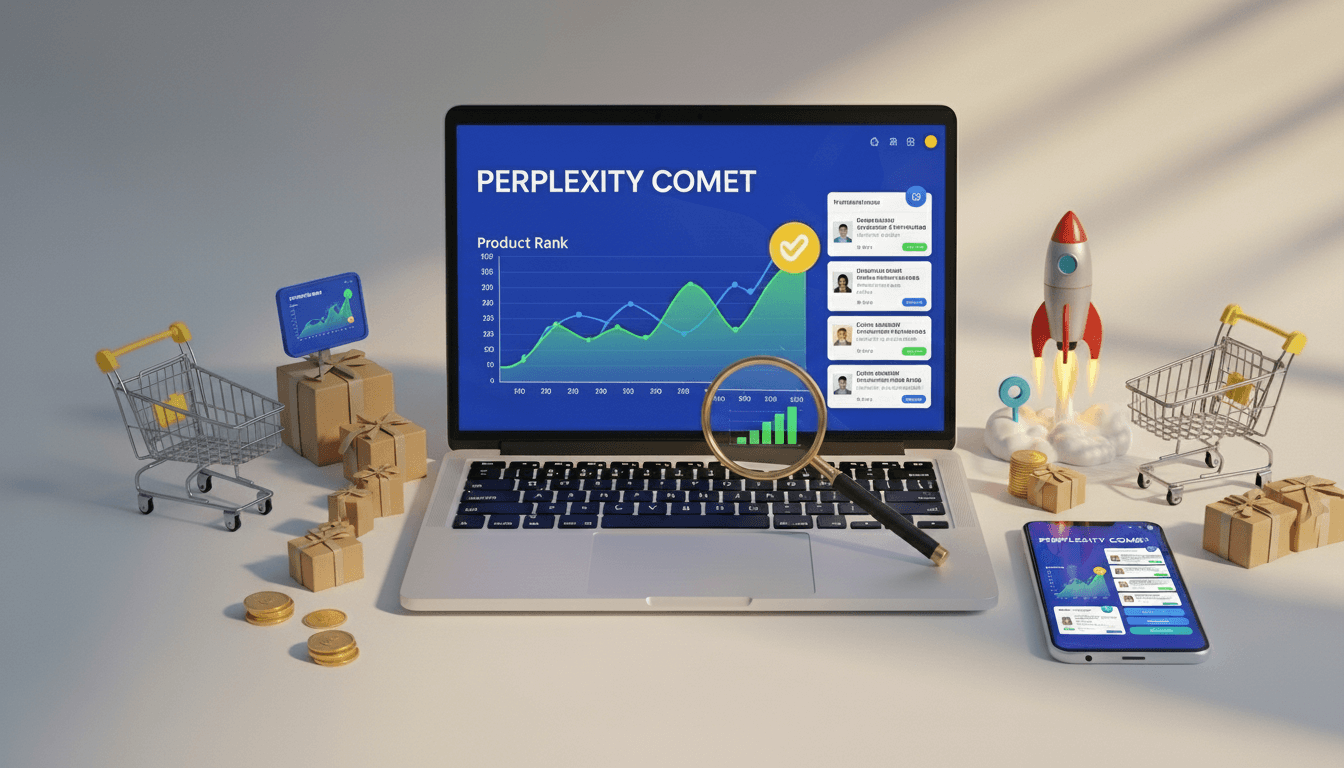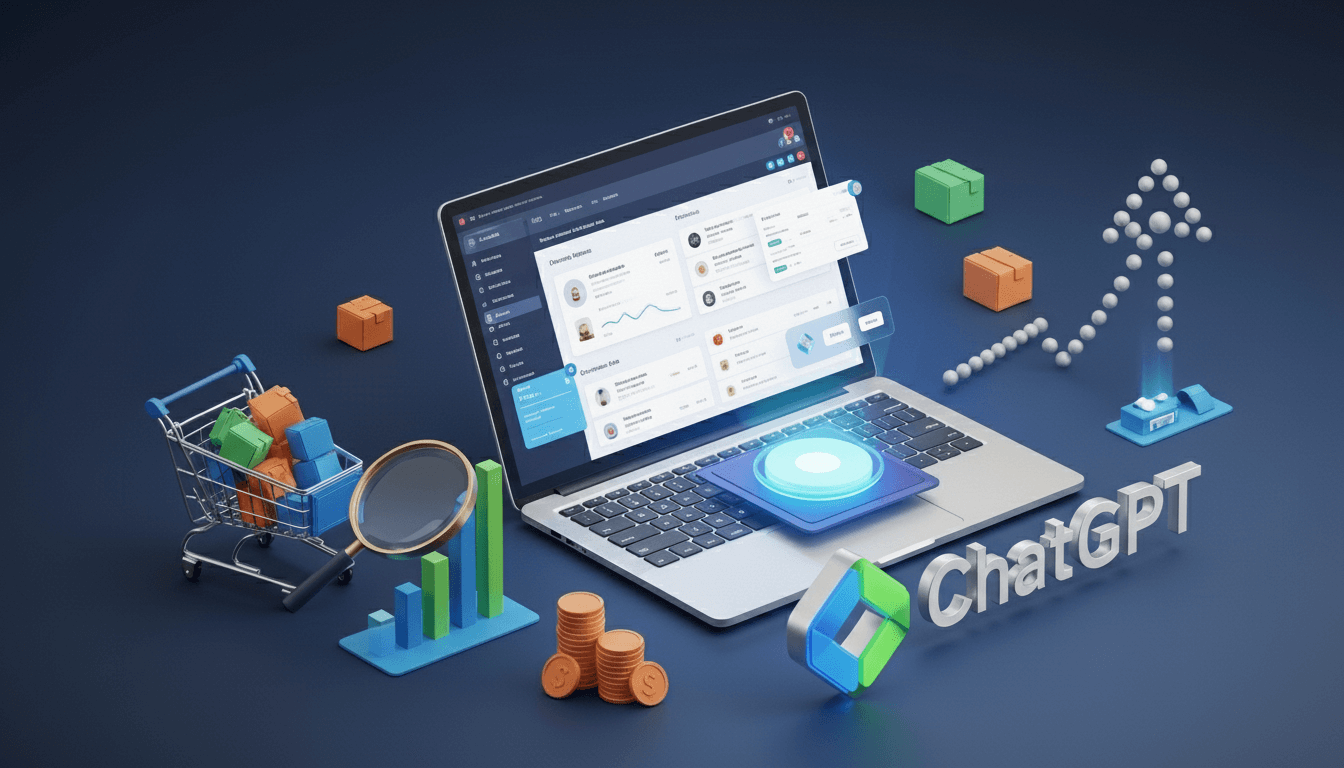AI Shopping Optimization for E-commerce | Get Products Found in AI Search

Product discovery is changing fast. Instead of searching “best wireless headphones” on Google, shoppers now ask AI tools like ChatGPT detailed questions such as “What are the best noise-cancelling headphones for travel under $200?”
This shift to AI-powered shopping is transforming how people find products and make buying decisions. If you only optimize for Google Shopping, you may miss high-intent buyers searching through AI tools.
What is AI Shopping and Why It Matters for Online Retailers
AI shopping refers to product discovery systems powered by artificial intelligence that understand natural shopping language and provide direct product recommendations instead of just listing store links. This includes:
- ChatGPT and GPT-4 shopping capabilities - Product recommendations and shopping advice
- Google AI Overview shopping results - Product suggestions at top of Google search
- Perplexity AI for product research - Detailed product comparisons with citations
- Voice shopping assistants - Siri, Alexa, Google Assistant for product orders
- Microsoft Copilot integrated with Bing Shopping
- Claude AI - Ethical and sustainable product recommendations
The Numbers Tell the E-commerce Story
The data shows AI shopping is exploding:
- AI shopping traffic grew 527% between 2024 and 2025 Over 67% of shoppers now use AI assistants to research products 75% of local shopping searches expected via voice by 2025 42% of Gen Z prefers asking AI for product recommendations over browsing Google 58% of shopping searches end without clicks to stores (AI provides recommendations directly) AI-referred shopping traffic converts 3.5x higher than traditional search
- AI shopping traffic grew 527% between 2024 and 2025
- Over 67% of shoppers now use AI assistants to research products
- 75% of local shopping searches expected via voice by 2025
- 42% of Gen Z prefers asking AI for product recommendations over browsing Google
- 58% of shopping searches end without clicks to stores (AI provides recommendations directly)
- AI-referred shopping traffic converts 3.5x higher than traditional search
For online retailers, this means: Shoppers are making purchase decisions and getting product recommendations before they ever visit your store or they're going directly to competitors' products that AI platforms recommend.
How AI Shopping Platforms Work
Unlike traditional search engines that match product keywords to store pages, AI shopping platforms:
1. Understand Shopping Intent, Not Just Keywords
AI shopping engines use Natural Language Processing (NLP) to understand what shoppers really want, even when they phrase requests differently.
Example Shopping Queries AI Understands as Identical:
- "Best budget laptop for college students"
- "What's a good cheap computer for university?"
- "Affordable laptop recommendations for freshmen"
- "Inexpensive but reliable laptop for school"
AI understands these are the same shopping need and provides relevant product recommendations.
2. Synthesize Product Information from Multiple Sources
Instead of showing 10 blue links to different stores, AI shopping platforms:
- Pull product information from multiple retailers
- Create comprehensive product comparisons
- Cite product sources (sometimes linking to stores)
- Present complete shopping recommendations in one response
- Include pricing, specifications, and availability
3. Prioritize Product Authority and Trust Signals
AI shopping engines are trained to recommend quality products, so they favor:
- Products with substantial customer reviews (50+ reviews minimum)
- High-authority product review sites (Wirecutter, CNET, TechRadar)
- Stores with verified purchase systems
- Well-cited product specifications
- Recent, updated product information
- Clear product schema markup
See more: How LLMs work for product understanding
The Shift from Keywords to Shopping Conversations
Traditional product SEO focused on keywords. AI shopping optimization focuses on answering questions shoppers actually ask when looking for products.
Old vs New Search Behavior
| Traditional Search | AI Search |
|---|---|
| "running shoes women" | "What are the best running shoes for women with flat feet?" |
| "coffee maker reviews" | "Which coffee maker makes the strongest coffee for under $200?" |
| "CRM software" | "What's the best CRM for a small business with 10 employees?" |
This shift means your product content needs to sound natural and conversational, answering specific shopping questions—not stuffed with product keywords.
If you're interested in the difference between product SEO and e-commerce AEO, find a detailed guide at E-commerce AEO vs SEO.
Essential AI Shopping Optimization Strategies for E-commerce
Hack #1: Answer Questions Before They're Asked
The Strategy: Structure your content around questions your audience asks, not just keywords you want to rank for.
How to do it:
- Use tools like AnswerThePublic to find real questions
- Check the "People Also Ask" section in Google
- Ask ChatGPT: "What questions do people ask about [your topic]?"
- Browse Reddit and Quora for common queries
Example: Instead of writing "Best Project Management Software Features," write "What Features Should I Look for in Project Management Software?"
Hack #2: Use the Question-Answer Format
The Strategy: Start with the question, provide a direct answer, then expand with details.
Template:
## What's the Best [Product] for [Specific Use Case]?
**Quick Answer:** [Product Name] is the best choice for [use case] because [main reason].
**Here's why:** [Detailed explanation with 3-5 key points]
**Other good options:** [2-3 alternatives with brief explanations]
Hack #3: Optimize for Featured Snippets
Featured snippets are often what AI tools read aloud or cite directly.
How to win snippets:
- Keep answers concise (40-60 words for text snippets)
- Use numbered lists for step-by-step processes
- Include comparison tables
- Answer the question in the first paragraph
Hack #4: Create Comprehensive FAQ Pages
AI tools love well-structured FAQ content because it directly matches how people search.
Best practices:
- Use actual customer questions as headings
- Provide complete, helpful answers
- Include FAQ schema markup
- Group related questions together
Hack #5: Write Conversationally
AI engines prefer content that sounds natural and human.
Tips:
- Write like you're explaining to a friend
- Use "you" and "your" to address readers
- Include contractions (you'll, we're, it's)
- Vary sentence length for natural flow
See more: How to rank ecommerce products in ChatGPT Atlas
What are the Platform-Specific Strategies
ChatGPT Optimization
What works:
- Comprehensive, detailed answers
- Current information (with dates)
- Multiple perspectives on topics
- Clear source citations
Content format:
- Long-form articles (1,500+ words)
- Step-by-step guides
- Comparison pieces
- Expert interviews
Perplexity AI Optimization
What works:
- Recent, updated content
- Visual elements (charts, graphs, images)
- Short articles with embedded videos
- List-based content (35% of cited content)
Pro tip: Perplexity cites sources 100% of the time, making it valuable for driving referral traffic.
Google AI Overviews Optimization
What works:
- Traditional SEO fundamentals
- Question-based content
- Schema markup implementation
- Mobile-friendly, fast-loading pages
Focus areas:
- Informational queries (99.2% of AI Overview triggers)
- How-to content
- Local search optimization
Voice Search Optimization
What works:
- Natural, conversational language
- Local SEO optimization
- Quick-loading mobile pages
- Question-based headings
Target phrases:
- "How do I..."
- "What's the best..."
- "Where can I find..."
- "Near me" queries
Answee ensures your conversational content is fully structured so voice assistants can recommend your products.
What are the Advanced Optimization Techniques
Advanced Hack #1: Citation Gap Analysis
The Strategy: Find articles where competitors are mentioned but you're not, then get included.
Process:
- Identify high-authority articles in your industry
- Note which competitors are cited
- Reach out to authors with valuable additions
- Offer exclusive data, updated information, or unique insights
Result: One placement can create visibility across multiple AI search variations.
Advanced Hack #2: Reddit and Community Optimization
Why it works: AI engines increasingly cite user-generated content from Reddit, which saw a 450% increase in AI citations.
Strategy:
- Join relevant subreddits in your industry
- Provide genuine, helpful answers (not promotional)
- Share insights about hidden costs, scaling challenges, or migration tips
- Focus on threads with 50+ responses
Advanced Hack #3: Content Freshness Signals
The Strategy: AI engines prioritize recent information, so refresh content regularly.
Quick refresh tactics:
- Update publication dates
- Add current examples
- Replace outdated statistics
- Include seasonal relevance
- Update internal links
Advanced Hack #4: Structured Data Implementation
Essential schema types:
- FAQ Schema for question-based content
- How-To Schema for instructional content
- Product Schema for e-commerce
- Organization Schema for brand authority
- Review Schema for testimonials
Advanced Hack #5: Multi-Modal Content Creation
AI search is becoming visual. Include:
- Charts and graphs for data visualization
- Infographics that summarize key points
- Video content (especially for YouTube integration)
- Images with alt text that describe your content
Technical Implementation
Site Speed and Performance
AI tools have strict timeout limits (1-5 seconds). Optimize for:
- Core Web Vitals compliance
- Mobile-first indexing
- Fast server response times
- Optimized images and media
Crawlability for AI Bots
Ensure AI crawlers can access your content:
# Example robots.txt for AI optimization
User-agent: ChatGPT-User
Allow: /
User-agent: PerplexityBot
Allow: /
User-agent: GoogleBot
Allow: /
User-agent: GPTBot
Disallow: /private/
Internal Linking Strategy
Help AI understand your site structure:
- Link related questions and answers
- Use descriptive anchor text
- Create topic clusters around main themes
- Implement breadcrumb navigation
How to Measure AI Shopping Success
Key E-commerce Metrics to Track
Traffic Metrics:
- Referral traffic from AI shopping platforms (chat.openai.com, perplexity.ai, ai.google.com)
- Voice shopping traffic
- Featured product snippet impressions
- Zero-click product impressions (brand awareness)
Shopping Engagement Metrics:
- Time on product pages from AI traffic
- Bounce rate by AI source
- Product comparison page engagement
- Add-to-cart rate from AI referrals
- Conversion rates from AI shopping traffic (typically 3-4x higher)
Product Visibility Metrics:
- Products recommended by AI platforms
- Shopping query coverage (% of target queries)
- Product citation frequency across platforms
- Featured product snippet wins
- Share of voice vs. competitors for shopping queries
Revenue Metrics:
- Revenue from AI-referred shopping traffic
- Average order value from AI recommendations
- Customer lifetime value from AI discovery
- Return on AI optimization investment
Tools for AI Shopping Analytics
E-commerce-Specific (Recommended):
Answee - Purpose-Built for Online Retailers:
- Real-time product recommendation tracking across 6 AI platforms
- Shopping query coverage analysis
- Product-level AI visibility metrics
- Revenue attribution from AI shopping
- Competitive product benchmarking
- Shopify/WooCommerce/BigCommerce integration
- Automated product optimization
Free Tools:
- Google Search Console (featured product snippets)
- Google Analytics 4 (with custom segments for AI traffic)
- Google Business Profile (for local shopping)
Premium Tools:
- Semrush AI Toolkit (AI Overview tracking for products)
- Ahrefs (product snippet opportunities)
- Writesonic GEO (brand visibility tracking)
What are the Common AI Search Optimization Mistakes
Mistake #1: Keyword Stuffing
Problem: AI engines prefer natural language over keyword-heavy content.
Solution: Write for humans first, then optimize for AI.
Mistake #2: Ignoring Voice Search
Problem: Missing the 75% of local searches happening via voice by 2025.
Solution: Include conversational, question-based content and local SEO.
Mistake #3: No Schema Markup
Problem: AI engines can't easily understand your content structure.
Solution: Implement relevant schema markup for all content types.
Mistake #4: Outdated Information
Problem: AI engines prioritize fresh, current content.
Solution: Regular content audits and updates with current information.
Mistake #5: Desktop-Only Optimization
Problem: Most AI searches happen on mobile devices.
Solution: Mobile-first design and fast loading speeds.
The Future of AI Search
Looking ahead, expect:
- More personalized AI responses based on user history
- Increased integration with shopping and commerce
- Multi-modal search combining text, voice, and images
- AI agents making decisions for users automatically
- Real-time information synthesis from multiple sources
Getting Started Today
AI search optimization isn't just about the future - it's about capturing opportunities available right now. While your competitors are still focused solely on traditional SEO, you can gain a significant advantage by optimizing for how people actually search today.
Start with the basics: answer real questions your customers ask, write conversationally, and make sure AI tools can easily understand and cite your content.
The brands that master AI search optimization now will be the ones dominating visibility when this shift becomes mainstream.
Ready to dominate AI search? The strategies in this guide give you everything you need to start optimizing for ChatGPT, Perplexity, Google AI, and voice search today.
Frequently Asked Questions - AI Shopping Optimization
AI shopping optimization is the practice of structuring your product catalog so AI-powered shopping assistants like ChatGPT, Google AI Overview, and Perplexity recommend your products when shoppers ask product questions. Unlike traditional product SEO that focuses on Google rankings, AI shopping optimization focuses on getting products featured in direct AI recommendations.
Traditional Google Shopping shows a grid of product listings. AI shopping provides direct product recommendations by synthesizing information from multiple stores and review sources. Shoppers get complete product answers immediately, often without clicking through to stores—making product recommendation more valuable than just ranking.
The key platforms are ChatGPT(highest shopping query volume), Google AI Overview (broadest reach), Perplexity (detailed product research), Microsoft Copilot (Bing shopping), Claude (ethical products), and voice assistants (Siri, Alexa, Google Assistant). ChatGPT and Perplexity currently drive the most high-intent shopping traffic.
Product content structured as shopping Q&A, comprehensive product FAQs, product comparison tables, and "best for" guides perform best. AI shopping engines prefer conversational, natural product language over keyword-stuffed descriptions. List-based product content accounts for 35% of AI product citations.
No. AI shopping optimization builds on traditional product SEO fundamentals. You need both since Google Shopping still drives significant traffic. The best approach is to enhance your existing product SEO strategy with AI shopping optimization techniques—they work together, not against each other.
Featured product snippets and voice shopping improvements can appear within 2-4 weeks. Full product visibility across AI platforms typically takes 2-3 months of consistent optimization. Results vary based on product category competition and optimization quality.
Answer Engine Optimization (AEO) for products focuses on getting cited in featured product snippets and direct shopping answers. Generative Engine Optimization (GEO) specifically targets AI models like ChatGPT and Perplexity for product recommendations. Both are forms of AI shopping optimization for e-commerce.
Track referral traffic from AI platforms in Google Analytics (chat.openai.com, perplexity.ai), monitor featured product snippet appearances, measure products recommended by AI, track shopping query coverage, and watch conversion rates from AI shopping traffic (typically 3-4x higher than traditional search). Answee provides specialized e-commerce tracking across all major AI shopping platforms.
Promotional product descriptions and keyword stuffing. AI shopping engines are trained to provide helpful, accurate product recommendations. They avoid overly promotional content and prefer natural, conversational product information that genuinely helps shoppers make informed decisions
Absolutely! AI shopping platforms prioritize product relevance, data quality, and shopping intent over brand size. Well-optimized small stores with detailed product information often get recommended over major retailers in specific product niches—especially when using tools like Answee to optimize at scale.
Manual approach: Time-intensive (15-25 hours/week) but free except for labor costs. Only scalable to 50-100 products maximum.
To appear in AI shopping platforms like ChatGPT, Perplexity, or Google AI, your product data needs to be structured and machine-readable. This means providing clear product descriptions, ingredients, use-cases, FAQs, and schema markup. Instead of doing all this manually, you can use the Answee Shopify plugin. It automatically scans your store, organizes all product information, and prepares it in a way that AI platforms can easily read and recommend—helping your products show up directly in AI-driven shopping results.





